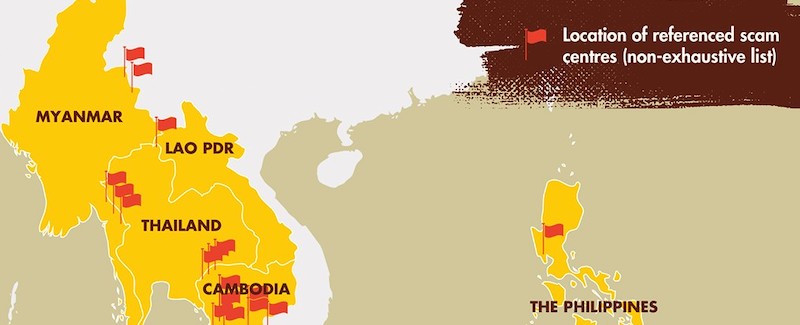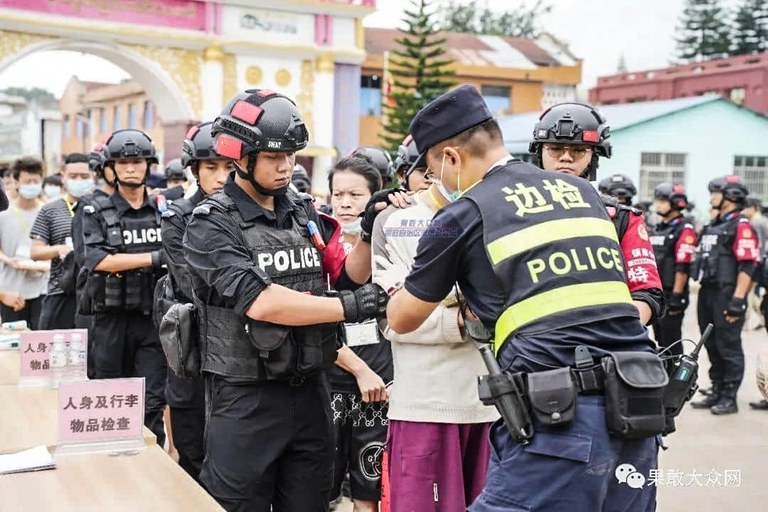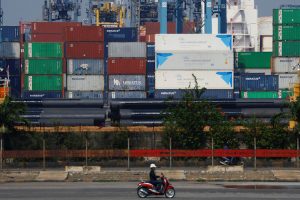The world’s big social media groups appear to be doing “very little” to crack down on the profusion of scams on their platforms, an expert on China-Myanmar criminal activity said this week.
Jason Tower, an analyst with the US Institute of Peace (USIP), said scams were being conducted on an “industrial scale” in special economic zones in Myanmar, Laos, Cambodia and elsewhere and this involved “tens of thousands” of people, who were often held against their will and forced by threats of violence to cheat people out of their savings.
Fraudulent call centres set up by Chinese triads or criminal gangs in lawless parts of Southeast Asia were reaping billions of dollars a year via posts that appeared daily on all the major international digital platforms, he said.
“There are countless numbers of fake social media accounts and they not to be taking responsibility on this – I think that is unacceptable,” he said.
ALSO SEE: COP28: France, US to Seek Ban on Private Funds for Coal Plants
Tower, who is fluent in Mandarin, has worked on Myanmar issues for over a decade, studying the role of illicit economies in conflict and Chinese criminal organisations. He spoke at a discussion at the Foreign Correspondents Club of Thailand in Bangkok on Monday night after a documentary on ‘pig butchering’, which is the Chinese expression for how Chinese digital scammers operate.

“There are posts daily for casinos in Kokang (special region in northern Myanmar) on WeChat, and countless others. I don’t need to name them all… It’s every single social media platform, their accounts are being targeted by these groups,” he said.
“There is a need to push the private sector to disrupt this, as this would cause some very significant reputational damage along the line.”
Special economic zones near the Myanmar-China border had become like “special criminality zones,” he said.
The FBI had issued a warning about these scam gangs in May, and “that needs to become common knowledge across the US and across the planet as these scams are quite sophisticated”.
The US Trafficking in Persons (TIP) report, put out annually by the State Department, had put a significant focus on this problem this year, Tower said, because of the number of people lured by cyber scammers to supposedly lucrative jobs, who were then trafficked to sites in Myanmar, Cambodia and Laos where they were made to trick and cheat money out of people.
‘Criminal kingpin’ held by Thai authorities for over a year
Thai authorities had detained She Zhijiang, a Chinese gambling tycoon and the alleged head of a notorious crime syndicate at Shwe Kokko on the Thai-Myanmar border opposite the Thai town of Mae Sot, in August 2022, but it was “perplexing why he has not been extradited” back to China despite being in custody for well over a year, Tower said.
Zhijiang appeared to be “trying another scheme”, portraying himself as a human rights victim, claiming that someone had been tried to kill him many times.
“Why is he in this endless detention?” he asked.
Thailand and other countries in the region “really need to be taking this seriously,” Tower said, noting that there videos on TikTok about organ harvesting and Chinese tourists were worried about their safety in Thailand because of shootings, as well as “money laundering and scam syndicates using Thailand as a transit hub”.
There were “very serious problems in regard to border management in Thailand” and “tens of thousands of trafficking victims from every corner of the planet, as more and more demographics were being targeted.”
People were selling crypto to strangers they met online till the victims lost huge sums and went broke.
“All these entities need to be taking this more seriously. A lot more leadership is needed – it’s very seriously affected Thailand.”
But he noted that “it needs more global leadership” as the problem involved “an incredibly complex set of issues”, ranging from human rights to civil society groups, governance gaps and corruption that enabled such crimes to be carried out.
There had been a “much more pronounced crackdown in China” on the scam centres this year and “now they’re starting to go after some of these kingpins”.
“But very little is happening in terms of response on social media.”

Thousands of suspects handed over to China
Myanmar authorities have handed over 31,000 telecom fraud suspects to China since law enforcement officers from both countries launched a crackdown on online scams in September, Chinese authorities said on Tuesday.
The suspects included 63 “financiers” and ring-leaders of crime syndicates that have cheated Chinese citizens of large sums of money, the Ministry of Public Security said in a statement.
“The crackdown has achieved significant battle results,” the ministry said.
More than 100,000 people engage in telecom fraud each day in at least 1,000 scam centres in Myanmar, which shares a border with southwest China, Chinese state media has reported.
Chinese police started to crack down on the fraud in September and this month, police launched what they said were “swift attacks” on crime gangs in Myanmar.
The Myanmar ringleader of a gang committed suicide last week while on the run from Myanmar authorities, Chinese police said. Three members of his gang were later handed over to Chinese police.
The Myanmar ringleader of a gang committed suicide last week while on the run from Myanmar authorities, Chinese police said. Three members of his gang were later handed over to Chinese police.
With telecom scams in Myanmar targeting Chinese citizens surging, Assistant Foreign Minister Nong Rong visited Myanmar this month, saying China was ready to work with Myanmar on tackling cross-border crime including online gambling.
Nong also said China supported Myanmar in maintaining stability on their common border as Myanmar’s junta battled insurgents in the area.
Myanmar’s ruling military is facing attacks on multiple fronts in its borderlands as an alliance of ethnic minority insurgent groups combines with pro-democracy fighters to challenge the junta’s rule.
China has called for peace.
“China has been playing a constructive role in its own way to promote peace talks and urge relevant parties to put the interests of the people first, cease fire and end war as soon as possible,” a foreign ministry spokesperson said on Monday.
- Jim Pollard with Reuters
ALSO SEE:
ASEAN Leaders Vow to Crack Down on Traffickers, Online Scams
Crime Gangs Control Some Myanmar, Laos Economic Zones: UN
China’s 58.com Under Fire Over Human Trafficking Claim
With $7.7bn Lost, Cryptoscams Hit A New All-Time High in 2021
Arrest of Macau Junket Mogul Rocks World’s Biggest Gambling Hub
























